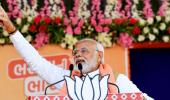Bhupendra Patel can never really break free of intervention from New Delhi.
But if he can win over the Gujaratis and improve the BJP's tally substantially, he will have proved that he should be taken seriously.

Bhupendra Patel, the man widely expected to stay chief minister of Gujarat after the elections next month, and Prime Minister Narendra Modi have a lot in common.
In 2001, Mr Modi found himself catapulted to the top job though he had no administrative experience.
Bhupendra Patel was a first-time MLA when he was chosen for the CM's job.
Mr Modi had taken office after a huge public calamity, the earthquake that year.
And as for Bhupendra Patel, immediately after being sworn in as CM on September 13 last year, he oversaw the rescue and relief operations in the flood-affected districts of Jamnagar, Junagadh, and Rajkot.
He also deflected the optics that Gujarat was one of the states where the pandemic was handled the worst -- Justice Burjor Pardiwala of the Gujarat high court referred to the Ahmedabad civil hospital as a 'dungeon' where people were sent to die.
There were differences too: When Mr Modi replaced Keshubhai Patel, supporters of the powerful Patidar caste came out against him all guns blazing that a mere backward-caste Teli, unknown in the rest of Gujarat, had managed to snag the job.
Bhupendra Patel, however, is from the Patidar community though it is doubtful if the Patidars beyond Ahmedabad would consider him their man.
In unofficially endorsing Bhupendra Patel for another term as CM, the BJP has clearly bowed to caste pressure.
The Patidars in Gujarat are as powerful in Gujarat as the Marathas are in Maharashtra.
The early Patidar leadership under Sardar Patel was staunchly loyal to the Congress though the first four chief ministers of Gujarat were Brahmins (Gujarat came into existence as a state in 1960).
In 1973, Chimanbhai Patel raised the flag of rebellion and he became the first Patidar chief minister, but from the Congress all the same. However, he could not consolidate the Patidar base.
Much later, another Patel became deputy chief minister and soon the unchallenged leader of the Patidars -- Keshubhai Patel, who was responsible for bringing round the Patidars to the BJP.
The movement started in Saurashtra, shifting the centre of Patidar leadership from central Gujarat to Saurashtra.
This coincided with the rise of diamond polishing as an industry in Surat.
Most were immigrants from Saurashtra.
Money power and political power got spliced and thus began a phase of Patidar dominance, which was responsible for the BJP's development and growth in Gujarat -- till Mr Modi came into the picture.
The resistance and resentment to Mr Modi's rise were defused over time partly because of Anandiben Patel's influence: She was identified as Mr Modi's lieutenant and the Patidars grew confident gradually that their dominance would continue.
Anandiben was appointed chief minister. But when she was replaced by Vijay Rupani, a Jain, rather than Nitin Patel, the Patidars showed their anger by backing the Aam Aadmi Party.
Although the AAP might find it hard to get too many seats, a growing vote share could make it an important future contender for power.
For the moment, like Mr Modi, Bhupendra Patel seems to have come into his own though intervention from New Delhi has been clear and present.
His right-hand man for years, Dhrumil Patel, was sacked within months of his elevation for 'influencing' police postings.
The sacking followed 'advice' from the prime minister's office.
Bhupendra Patel has told ministers that as they have reached where they have because of the party, they need to work for it.
His administrative interventions -- tap-water supply in eight districts, a Rs 100 crore (Rs 1 billion) fund to support organic farming, and revamped modern public bus transport --have been aimed at ordinary people, while tapping into the business vein of all Gujaratis by snagging the Vedanta-Foxconn investment for semiconductors and fabs, amounting to Rs 1.54 trillion, leaving neighbouring Maharashtra gnashing its teeth.
The DefExpo was held in Gujarat just a few weeks ago, and while it was limited to companies that already had a manufacturing presence in India (which somewhat dilutes the investment-drawing potential of Def Expos as an idea), it was a well-managed event.
In all his endeavours, New Delhi has backed him solidly and that's half the battle.
Vijay Rupani, Nitin Patel and Bhupendrasinh Chudasama, all important poles of political power, are not contesting the election, knocking out potential claimants for the top job.
Thirty sitting BJP MLAs will be replaced, leaving the CM to infuse new blood into the government loyal to him if the BJP returns to power.
And the stream of defections to the BJP from the Congress continues unabated.
In 2017, although it formed the government, the BJP had its lowest tally of MLAs, 99, in two decades.
It won subsequent elections and managed to boost its numbers.
The challenge this time is to post an unprecedented result.
Bhupendra Patel can never really break free of intervention from New Delhi.
But if he can win over the Gujaratis and improve the BJP's tally substantially, he will have proved that he should be taken seriously.
Feature Presentation: Aslam Hunani/Rediff.com











